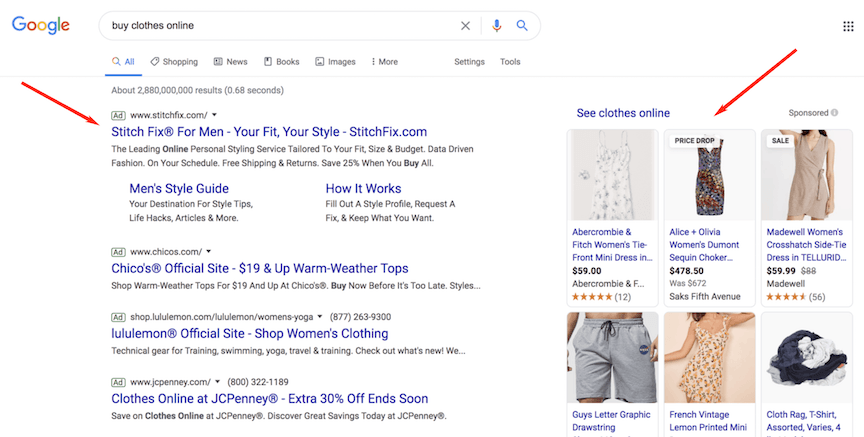Discover the power of Pay-Per-Click (PPC) advertising, where businesses typically see a $2 return for every $1 invested. This article delves into the essence of PPC, exploring its mechanics, significance, and optimal usage scenarios. Learn how PPC can elevate your online presence, drive sales, and deliver a remarkable ROI. We’ll examine:
– The fundamentals of PPC advertising
– The functioning of PPC campaigns
– The importance of PPC in digital marketing
– The ideal times to employ PPC ads
To delve deeper into PPC strategies, explore our extensive library of free PPC resources.
PPC is an online advertising model where advertisers pay only when users click on their ads, rather than paying for impressions or time. These ads appear as display banners on websites, social media platforms, and predominantly on search engine results pages (SERPs). When a user clicks on a PPC ad, they are directed to a landing page on your website. See an example of PPC ads on a Google SERP here: .
We’ll use Google’s search results to illustrate how PPC operates. When a user searches on Google, the platform checks if advertisers have bid on the relevant keywords. For instance, an online sock retailer might bid on keywords like “buy socks online” and “fun socks.” If an advertiser wins the bid, Google selects ads to display through an ultra-fast, automated auction process. The auction considers various factors, including the bid amount and the ad’s quality score, to determine the ad rank. Ads with the highest ad rank are displayed to users.

To calculate the ad’s quality score, Google evaluates factors such as expected click-through rate (CTR), relevance to the user query, and the quality of the landing page. A higher quality score translates to lower costs per click (CPC). With a strong quality score, you can enhance the relevance of your ad content and improve your ROI.
PPC is an effective digital marketing tool when implemented with the right strategies and high-quality ads and landing pages. It’s particularly beneficial for achieving rapid results or targeting specific audiences, especially those at the bottom of the marketing funnel. Here are some compelling statistics:
– In 2022, global companies spent $164.6 billion on search advertising, expected to grow to nearly $190.5 billion by 2024.

– PPC ads account for 45% of page clicks.
– 75% of consumers find ads helpful in their search for information.
– Visitors arriving via PPC ads are 50% more likely to make a purchase than organic visitors.
– Search PPC ads can increase brand awareness by up to 80%.
The main advantages of PPC include cost-effectiveness, quick results, increased visibility, precise targeting, and detailed reporting. These factors make PPC a highly effective digital marketing channel.
When is PPC most effective?
1. For immediate results: Use PPC to quickly launch campaigns and gain immediate visibility.
2. For precise targeting: Reach your desired audience with tailored ads based on demographics, interests, and past activity.
3. To engage bottom-of-funnel leads: Target users who are close to making a purchase decision.
4. When organic search results are limited: PPC can help new websites or those with limited content gain immediate visibility on SERPs.
At WebFX, we’ve managed over 650 client PPC campaigns, ensuring we understand the nuances of this strategy. We offer PPC consulting services to optimize your campaigns and can also create and manage your PPC strategy, including ads and landing pages, to help you achieve your goals.
For more digital marketing insights, subscribe to our email newsletters, and learn about our PPC management services and other digital marketing offerings by requesting a free quote today!











